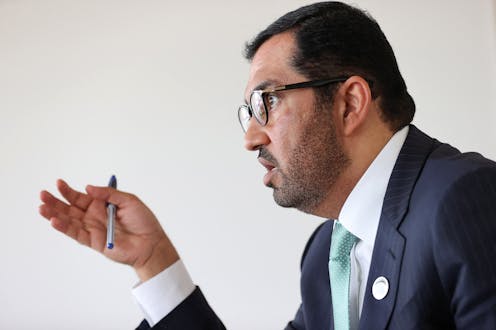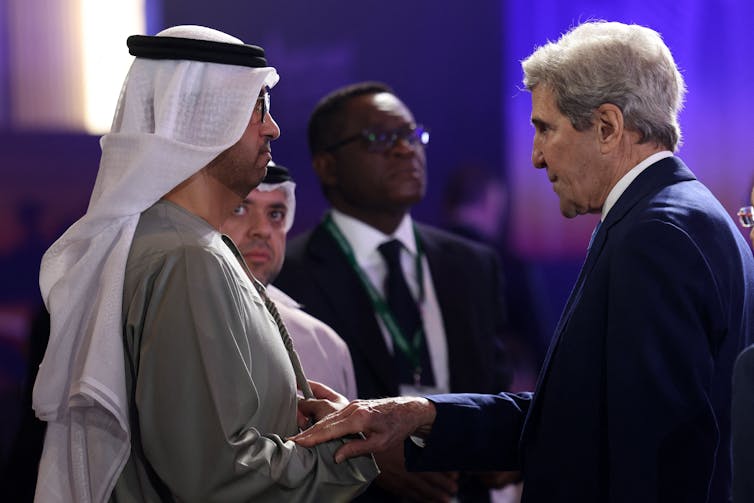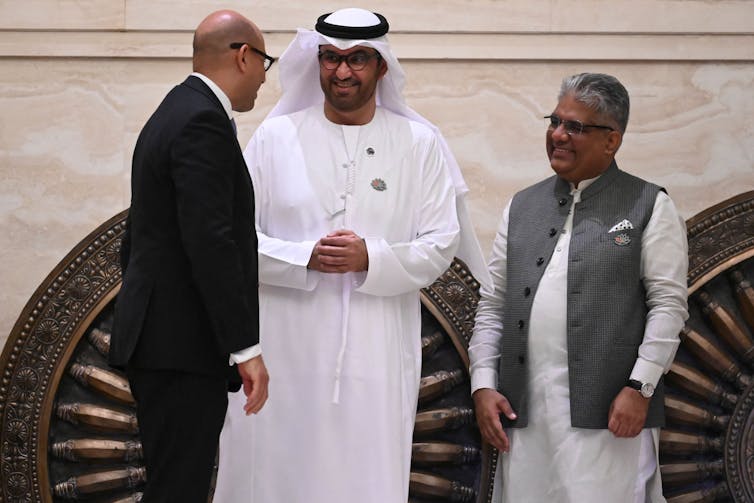
In December 2023, negotiators from countries worldwide will meet in the United Arab Emirates for the next round of international climate talks. While the talks are considered essential to securing global agreements needed to avoid dangerous climate change, confidence in the summit, known as COP28, is at a low. One reason is the man in charge.
The UAE set off a firestorm in January 2023 when it announced that Sultan Ahmed al-Jaber, the CEO of the state-owned Abu Dhabi National Oil Company – also known as ADNOC – would be the president-designate of the climate summit, giving him a large amount of control over the meeting’s agenda.
U.S. and European politicians demanded al-Jaber’s resignation. Former U.S. Vice President Al Gore claimed that fossil fuel interests had “captured the U.N. process to a disturbing degree, even putting the CEO of one of the largest oil companies in the world in as president of COP28.”

Concerns about the role of fossil fuel industries in obstructing pro-climate policies are entirely legitimate, in my view. There is abundant evidence that the largest fossil fuel companies knew their products would cause climate change decades ago, but deliberately attempted to deny climate science and oppose climate policies.
However, I believe calls to boycott COP28 and ban the region’s choice to lead it are undermining the credibility of United Nations negotiations and are overlooking the potential of the COP28 agenda.
I am a former adviser to the U.N. Environment Program and a scholar of environmental ethics. My own concerns about this issue led me to team up with six colleagues from across the Global South to conduct a detailed comparative analysis of the goals and behavior of the five most recent COP presidencies.
We concluded, to our surprise, that the policy agenda being promoted by the UAE’s COP28 presidency would do much to accelerate the transition away from fossil fuels. We also found that many criticisms of the UAE’s presidency are unfounded.
How al-Jaber was chosen
First, it’s useful to understand how COP presidents are chosen.
Choosing which country hosts a COP summit is managed by a United Nations process that rotates democratically among six regions. The countries in each region consult about who will represent their region, and that country makes a pitch, which is assessed and finalized by the secretariat that runs the U.N. Framework Convention on Climate Change.
For COP28, the Asia-Pacific region, which consists of a diverse mix of developing nations, chose the UAE and al-Jaber.
Energy concerns of the Global South
For some Global South nations, the prospect of phasing out fossil fuels – called for by many activist groups and countries headed into COP28 – seems not only daunting, but a threat to economic development.
Of the dozens of oil-producing countries in the world, around half are middle-income developing countries with economies that are highly vulnerable to volatile oil and gas prices. Studies have suggested that a fast fossil fuel phaseout could cause trillion-dollar losses related to infrastructure investments in oil-producing countries if they aren’t prepared.
At the same time, however, many nations of the Global South face disproportionate consequences from climate change, from extreme weather events to rising sea levels that can threaten the very existence of their communities.
Al-Jaber has called phasing down fossil fuels “inevitable” and “essential”, but he has said the energy system and the Global South aren’t ready for a fast phaseout until renewable energy ramps up and that the summit should focus on adaptation. That view, while supported by some countries in the Global South, has drawn sharp criticism.
Al-Jaber, Masdar and ADNOC
Al-Jaber’s presidency of COP28 has been described by some as an attempt by the UAE to “greenwash” oil and gas expansion plans by ADNOC, one of the largest oil companies in the world.
While I am sympathetic to this concern, my colleagues and I found it to be far too simplistic. Al-Jaber spent the bulk of his career in the renewable energy sector. In 2006, he founded and ran the UAE state-owned renewable energy company, Masdar, which he helped to grow into the largest renewable operator in Africa.
He was appointed CEO of ADNOC in 2016, in the context of the UAE’s official launch of a national “post oil strategy.” The previous year, Crown Prince Mohammed bin Zayed delivered a speech to a UAE government summit declaring that the UAE would celebrate “the last barrel of oil” by mid-century.

ADNOC has been heavily criticized for planning to invest US$150 billion in oil and gas expansion capacity this decade. I share these concerns. To stay within the 1.5-degree Celsius (2.7-Fahrenheit) global warming limits adopted under the Paris Agreement, the world may need to cease new fossil fuel investments, as the International Energy Agency has urged, and also decommission some 40% of already developed fossil fuel reserves.
However, I also believe this must be viewed in a global context when discussing the COP28 presidency: Far larger fossil fuel growth plans than the UAE’s are being led by the U.S., Canada, Russia, Iran, China and Brazil. Most fossil fuel financing around the world comes from banks in the U.S., Canada and Japan. And since 2015, European banks have poured a colossal $1.3 trillion into fossil fuels, including $130 billion in 2022 alone.
The COP28 agenda
In our assessment, we found that the UAE is already providing leadership that goes beyond previous COP presidencies.
Our report found that the total value of the renewable energy projects planned by the UAE with various partners this decade adds up to over $300 billion. This is considerably bigger than clean energy investments mobilized by previous COP presidencies, our analysis found.
The COP28 agenda that the UAE is promoting also offers a promising pathway to accelerate a transition away from fossil fuels.
The agenda includes a goal of tripling renewable energy capacity within the next seven years, further driving down costs to rapidly outcompete fossil fuels, potentially within the next 20 years.
It also calls for countries to agree to eliminate fossil fuel production where carbon emissions are not captured by around midcentury, which could fast-track scaling up carbon capture, usage and storage commercially.
And restructuring climate financing to make it low-cost and reduce debt burdens, as the UAE presidency proposes, could finally unlock the trillions of dollars desperately needed by the developing world to support its energy transitions while industrializing. Given that lack of financing is the key obstacle to the energy transition in developing countries, COP28’s focus on this is critical.
Certainly, the optics of having an oil CEO lead a climate summit is concerning for anyone who advocates rapid-action phasing down of fossil fuels, and it remains to be seen how dedicated the UAE is to these policies. But I and my co-authors of the report concluded that if the COP28 summit succeeds in securing landmark agreements on the above issues, it would be a significant step forward in fast-tracking a just transition away from fossil fuels and a considerable improvement on what has been proposed in past COP summits.
İbrahim Özdemir was previously Director General of the Department of Foreign Affairs in the Ministry of National Education in Turkey. He was previously a member of the UNESCO Turkish Commission Board between 2005 and 2010, Turk Felsefe Dernegi (The Turkish Philosophical Association) between 2001 and 2009, and the Turkish Foundation for Combating Soil Erosion, for Reforestation and the Protection of Natural Habitats between 2000 and 2004.
This article was originally published on The Conversation. Read the original article.







